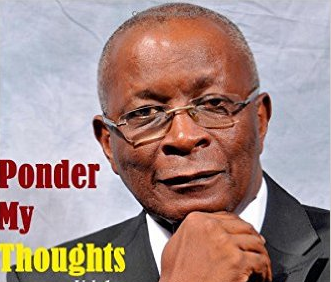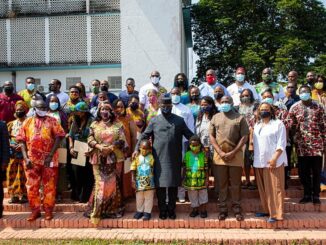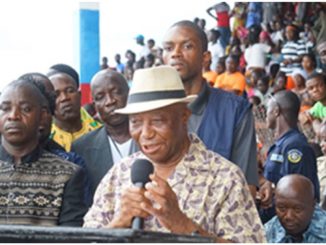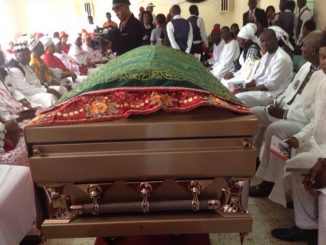
PONDER MY THOUGHTS
By. Andrew Keili
CRY, THE DIVIDED COUNTRY: WHERE DOES THE BUCK STOP?
Sierra Leone politicians were divided even at independence. Independence festivities were overshadowed by the state of emergency, declared ten days earlier following a campaign of sabotage by the opposition All People’s Congress Party (APC). The APC had been urging that independence should be postponed until free elections were held. Its leader, Siaka Stevens, was arrested about a week to independence along with his right-hand man, Wallace Johnston, and 16 other party members. They had been planning a general strike to coincide with the independence celebrations, and it was feared riots would break out if the strike went ahead. It would seem we went into independence with many problems simmering beneath the surface, some of which are with us to this day.
If there is one thing nearly everyone agrees upon, it would be that Sierra Leone is a divided country and the division is even more acute now. It is not my intention to analyze the reasons for the division; I will merely state the facts. Let us take a look at some of the things that divide us. We are:
1. Divided by Political colours
Red and green, the colours of the APC and SLPP respectively divide us. Ardent loyalists of these political parties could not be seen dead in the colour of the “enemy”. This has been extended to other areas of our national life to the extent that there have been fights over these colours at school sporting functions, ensuring that the colour division is etched in the minds of our younger folks.
2. Divided over how we are counted-the census division
There is little doubt that the SLPP prefers the use of the 2021 mid-term census results for delineating boundaries and constituencies. The APC prefers the 2015 census results. The census conducted during the tenure in governance of each party tends to give it an advantage in number of people in party strongholds and accusations of “census fixing” have now become the norm. We don’t seem to agree on how we should be counted and on our numbers.
3. Divided by ethnicity and region
The ethno-regional divide of the country is evident from election results. The APC is predominantly a North Western Party and the SLPP South Eastern, each region composed of dominant major tribes. There are accusations that the “majoritisation” of our governance system means that this gets translated into plum jobs and greater resources for the areas with predominant support for the governing party.
4. Divided over the type of electoral system to adopt
Proponents of the current constituency electoral system and the proportional representation system have been very forceful in making their case for their preferred electoral system. To date, we are unsure about the electoral system we will adopt at the next General elections.
5. Divided over reasons for recent riots
The government and its supporters say that underlying the recent deadly protests was an insurrection meant to destabilise the state and result in a forceful take-over of power and that this was instigated by the opposition APC. The opposition APC says they had no hand in this and that several issues relating to the general discontent of the populace led to this situation.
6. Divided over suitability of members of the investigative committee for the recent riots
The government says the investigating committee set up is an unbiased committee, representing apt major stakeholder groupings. The opposition thinks not and says there are many members who have already aired their views on who was responsible for the riots, who should not have been on the committee.
7. Divided over government Achievements
Each of APC and SLPP party claims it has done better than the other, especially in the area of infrstructure. Each claims that it finished what its predecessor messed up. Meanwhile nobody mentions the role played by donors.
8. Divided over which party is more corrupt
Each of the two major parties claims the other is more corrupt and they are only cleaning up the egregious mess caused by its predecessor, usually setting up a commission of inquiry to prove this.
9. Divided over who has a better Human rights records
Each party rubbishes the human rights record of the other. Independent assessments are however not flattering and it’s more like six of one and half a dozen of the other.
10. Divided over cause of hardship
SLPP claims the current hardship is a global phenomenon. APC says yes to a certain extent but it is also considerably self-inflicted because of the government’s profligate spending.
11. Divided over perception of international community on issues
Each of the two major parties claims the International community supports their stance on various issues. The SLPP claims in particular that this support is because of its commendable performance in governance. The APC claims this is happening in spite of the government’s poor performance only because they want to prevent Sierra Leone from being a failed state.
12. Divided over our perception of the judiciary’s independence
Each of the major parties, when in opposition claims the judiciary is not independent, gives spurious judgments and meddles into its affairs. Each party when in governance does not agree.
13. Divided between Central vs local government
Each major party claims when they are in opposition that major local government councils in opposition strongholds are interfered with but when in governance claims that these councils have a proclivity to sabotage the sitting government.
14. Divided into various factions within parties
The division within parties is accentuated when a party is in opposition, with the flagbearer issue often dominating the fight. The division often results in court cases, with accusations of the governing party meddling into the affairs of the opposition.
This is quite a handful and perhaps wanting a uniformity of views may be utopian. The divisions that lead to outrage and violence sparks, threatening peace and security in the country should especially be kept in view.
There are admittedly a few areas in which we find unity. The areas of religion and sports by our national team-especially football come to mind.
But who should sort out this mess? Chapter 11 of the 1991 constitution on “Fundamental principles of state policy” sheds some light on this. Whereas sovereignty belongs to the people of Sierra Leone from whom Government through the Constitution derives all its powers, authority and legitimacy, the security, peace and welfare of the people of Sierra Leone is the primary purpose and responsibility of Government. A political objective is that the State “shall promote national integration and unity and discourage discrimination on the grounds of place of origin, circumstance of birth, sex, religion, status, ethnic or linguistic association or ties”. Added to this are social, educational and other objectives.
The principles contained therein are fundamental in the governance of the State, and it is the duty of Parliament to apply these principles in making laws. The President who is head of state acts as a symbol of national identity and helps promote unity and pride and also acts as the symbol of the nation for the international community. He is also the head of government, overseeing the operation of the civil service and government agencies and appoints members of the government.
So, Parliament and the President have a yeoman’s role to play. In our present predicament, the buck stops with the President who should use all levers at his disposal to stem the huge division, irrespective of who is at fault. He has all levers at his disposal- both ”carrot levers” and “stick levers” and is expected to use them circumspectly. “Uneasy lies the head that wears a crown” is an apt description of his predicament as he grapples with advice from all quarters-some genuine and prudent and others not, on which levers to use to address the acute divide in the country.
The sign “The Buck Stops Here” was on President Truman’s desk in his White House office. On more than one occasion he referred to the desk sign in public statements. In his farewell address to the American people given in January 1953, President Truman referred to this concept very specifically in asserting that, “The President–whoever he is–has to decide. He can’t pass the buck to anybody. No one else can do the deciding for him. That’s his job.”
History will not be kind to any President under whose watch the nation disintegrates, irrespective of who is at fault. The buck stops with the President!
Ponder my thoughts.



